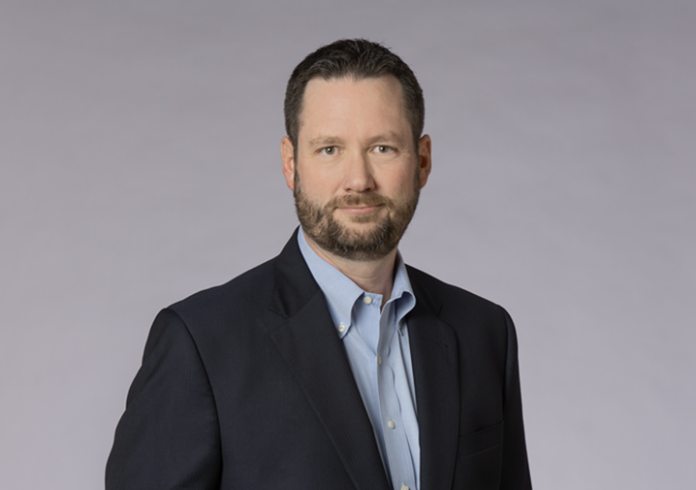The Regulator and the regulated: This is the second of a two-part conversation with two of the key players in the energy debate in Kansas. On Monday, we spoke with Andrew French, chair of the Kansas Corporation Commission. Today, we talk to Chuck Caisley, the chief customer officer at Evergy who is often at the Capitol defending the company’s interests. Neither interview generally touched on specific policy matters now pending before the KCC, but they rather tried to offer a broader view of two people who are among the players in the energy policy debate at the Kansas statehouse.
Caisley is often the face of Evergy at the Capitol, testifying in the interest of the utility before legislative committees in the House and Senate.
But his career has been far more expansive than energy.
He’s a 1995 graduate of the University of Illinois and he earned a law degree at St. Louis University.
He started out his career as a prosecutor in Franklin County, Missouri, and then worked as a trial lawyer for his father-in-law’s law firm in St. Louis.
He made a splash in Missouri politics when he ran the House Republican Campaign Committee, which elected the first GOP majority in the House in 48 years during the 2002 elections.
He went to work as chief of staff for Catherine Hanaway, who became the first female speaker in the Missouri House after the 2002 elections.
He ran Hanaway’s unsuccessful campaign for Missouri secretary of state in 2004.
He left politics to become president of the Missouri Energy Development Association.
He joined Evergy as director of governmental affairs in 2007 where he’s been since and is now the chief customer officer and senior vice president of marketing and public affairs.
Growing up on politics
“Politics has been, as Hank Williams Jr. would say, a family tradition for a long time. I grew up about 50 miles or so south of downtown Chicago. There was a cornfield in my backyard, but 15 minutes north of me was one of the biggest cities in the country. I was actually born about 20 miles west of there in a town called Morris, Illinois. My grandfather was mayor of a town of about 10,000 people. That is about as retail, elected official politics as you get. It was all about solving people’s problems and trying to make the government work for them. As far back as I can remember, I remember marching in parades with him and throwing candy and handing out stuff. I always thought that was pretty cool. This was back in an era when we went to Sunday dinner with my grandparents every single, solitary Sunday. He would discuss the town’s problems and the issues and what he was working on. Frequently on a Sunday afternoon, (he) would disappear and go do something. Sometimes I’d go down to the fire station with him. Sometimes we’d go down to City Hall. Sometimes, we’d go visit somebody who’s having an issue.”
College politics and beyond
“I went off to college and just got real active in politics in college. At the time, Jim Edgar was governor of Illinois – I think maybe the last governor not to be indicted. I got involved in his college (reelection) apparatus, not just our college but a bunch of the other universities in Illinois. When that was done and I graduated and I came down to St. Louis to go to law school, I used those connections to get connected with (U.S. Sens.) Kit Bond and John Ashcroft’s office and became an intern there. I was an intern in their St. Louis district office. Bond, in ’98, ended up running for reelection and I worked on his campaign in ’98, and I also worked for a lady who nobody knew at the time, her name was Catherine Hanaway. She was a senior official in his office. She was a senior official in his campaign, but she also was running for a state rep seat. I ran that and worked on Bond’s campaign, and she ended up winning that election in ’98. I didn’t think too much of it. I went back to prosecuting and then ultimately went into private practice.”
Building a GOP majority
After getting elected to the Missouri House, Hanaway reached out to Caisley and offered him a job running the House coordinated campaign to build a Republican majority in the Missouri House. “I told her she was nuts. That’s literally what I said. It’s been 50 years since a Republican has been speaker of the Missouri House. Many, many people have tried. Never gotten close. This is a yellow-dog Democrat state, and it’s always going to be that way. Republicans may have the ability to win statewide offices, but the districts are so tilted in favor of the Democrat majority it’s never going to happen.
“She said, ‘I’ll tell you what, I will pour you a glass of scotch and my husband will barbecue, and I want you to come over and want you to hear why we can take it.’ I went over there and she laid out the fact that they were redistricting and that term limits were going to take a whole bunch of people out. There were going to be about 100 open seats, I think, out of a 163-person statehouse. She said there will never be another opportunity that comes along like this again.”
Caisley went home and talked the matter over with his wife. He told her he would have to leave the family law firm and he would earn about 50% less a year. “She said, ‘As long as you don’t intend on going out and getting a brand new lawyer’s car, let’s go do it. This is where your heart is,'” Caisley said.
Republicans took more legislative seats in Missouri in 2002 than any other state in the country other than Texas, he said. “From there, never looked back. I stayed involved in politics for a while and ended up working on Bush’s reelection campaign, ending up running (Hanaway’s) secretary of state race. It was a great run.”
Why work for Hanaway
“There were maybe two or three things about her. Part of it was the lady was wicked smart and wicked driven. Anytime I can find somebody who knows what they want to do, knows who they are and is smart and is driven, you can learn a lot from folks like that. One was just this notion that if I got to spend time with her and the people that she worked with, I would learn a great deal.
“The other thing is, she was real. I can think of a half a dozen times when she was the speaker that she could have made choices that would have been a better political choice for her to make. It would have helped her run for statewide office. It would have helped her raise more money. It would be something she could have done because she had the power to do it as speaker, and she went the opposite way because it went against a conviction or she just didn’t think it was the right thing at the right time.
“She’s pro Second Amendment. But when she represented her district, her district was not. Her district was very mild, very moderate on guns. As a state representative, she cast votes that were reflective of her district and what her constituencies had said to her, knowing that she was going to run for statewide office, knowing it was an issue she could be primaried on and knowing that it would ultimately hurt her chances.”
Influence of politics
“It gave me a very unique perspective about the way the world works. I think that people are very jaded about politics and elected officials – even more so today than they were back then. I think what people don’t realize is that our elected officials at the end of the day are a reflection of us. They’re a reflection of the influences and the people that interact with us. We shouldn’t be surprised that, for example, that the U.S. House of Representatives is divided and dysfunctional. We have a divided populace and a largely dysfunctional society right now. We don’t agree on anything. There are two sides to every story and to the degree that there’s 35% on one side and 35% on the other and the rest in the middle who are just tired of hearing about that. Politics and elected officials are a reflection of us. We’re not going to fix that until we find commonality as a society.”
Transition from politics to energy
“I can remember being the speaker’s chief of staff, and probably the most intense group of associations and conversations that we had down there that weren’t drawn up in social issues or weren’t drawn up in budget issues was this conversation over energy. As the speaker’s chief of staff, she would have three or four major priorities that she would work on personally and concentrate on. I got to catch almost all the rest of it. This was an area that kind of fell into that. She wanted to be aware of it, but she needed somebody else to manage it. So it was the utility company CEOs and it was the big business, big user CEOs sitting across the table in my office talking about this.
“I always thought they were really interesting issues. Energy is central to economic development and cost competitiveness is central to economic development, but so is reliability. This is one of those true issues where you had to learn about it, you had to understand the finances of it, you had to understand the operation of it. And it was an essential good, an essential service that was very central to the economy, but never quite rose to the level of being like the No. 1 issue.
“When I left the speaker’s office and after running her campaign (for secretary of state), I had no intention at all of getting involved in energy. I was going to go either to one of (a) couple big law firms – Bryan Cave, Armstrong Teasdale – and either be out in D.C. or be in St. Louis and run a part law practice, part lobbying government affairs practice at either of those two places.” He was approached by the then CEO of what was known at the time as Empire District Electric who asked him to become president of Missouri Energy Development Association.
Initially, Caisley wasn’t that interested. He interviewed for the job at the behest of the Empire CEO. During the interview, Caisley said he didn’t know who the past president of the group was, which spelled trouble.
“Frankly, I don’t know who your former president is, and as the immediate past speaker’s chief of staff, you realize that’s a problem for you. That means it’s not very effective,” Caisley said in recalling the interview. “I don’t know what you’re spending on this, but you’re not getting a lot of bang for your buck. I know who all of you are, but your association I don’t understand at all.”
During the interview, he explained what he would do to grow the group’s prominence in the state. He was eventually offered the job, which he later accepted after talking it over with his wife and deciding that he want to raise a family in the Midwest.
How do you think Evergy is
perceived at the Kansas statehouse?
“I think that has evolved certainly over the last decade, particularly the last five years. I think there’s probably a bunch of reasons for that. I think if you go back six to eight years…I think we had a very strong reputation and very little controversy over the things that we asked for, and I think it was strong.
“I think that Evergy – born of Westar and KCP&L – was contentious and difficult from the very beginning. What nobody remembers anymore is that actually it all started in 2016. It wasn’t a merger to begin with. Westar put itself up for sale. Evergy bought the company but then failed to get regulatory approval. If you go back to that time period, the speaker of the House, the president of the Senate, 20 senators, massive amount of communities all around Kansas and Missouri supported and wrote letters on behalf of the transaction. The reason for that was a strong local utility they believed was important to economic development and important to the state. I still think it is.
“When that did not go through, both companies were left trying to figure out: ‘What do we do now?’ We ultimately figured it out with a merger of equals, but there was two years of media sensationalized coverage of: Is this good or is this bad? There were particular stakeholders involved who were using the opportunity to get things that they wanted. Coming out of that, I think, that hurt reputationally. A lot of folks thought maybe it had been bought and wasn’t any longer a Kansas or a Missouri company. In fact, when we had our public hearings (for) just this last rate case in Kansas, we had people come up and testify all the time, ‘Service was a lot better when Evergy was KCP&L or Evergy was Westar. But once it got bought by those other folks, then it really fell off.’
“Every single, solitary executive here was a KCP&L (and Westar) employee. The shareholders are the same. The board is the same. It’s amalgamation of the two. We still got headquarters in Topeka and in Kansas City. We’re not a different company.
“There’s a perception with a new name and a 135-year company name in KCP&L going away and a 20-year name in Westar going away.” He said there was “absolutely a perception” that Evergy was new and different and “people don’t like change.”
“And then Elliott happened. I don’t think people really understood that. I don’t think they understood that it was an adversarial relationship between us and Elliott. I don’t think people understand that even today, they’re out of our stock. Their desire was to sell the company. That didn’t happen. I think there are some lingering effects there.
“I think the third thing that’s happened is some of the larger user stakeholders and associations have gotten smart and have started to use energy and energy costs in a very populist way. We’re an easy target. You can use words like ‘monopoly.’ You can use words like ‘largest rate increase ever’ when it’s the largest for revenue but it’s because we’re combined company now. It’s disingenuous buzzwords, but without a lot of education on the other side, it’s easy to pick on us. We don’t spend a lot of money out there relative to other organizations advertising and trying to prove out our value proposition.”
Are you personally too confident
in dealing with elected leaders?
“I wouldn’t be doing this if I didn’t believe in it. This isn’t just a job to me. This matters to me, and I think it matters to the state. I think honestly both states (Kansas and Missouri) probably don’t understand the benefit that they have of having this company located in Missouri and Kansas, the good that it does and that it’s one of a very few states that have this left. There’s probably a dozen states that have large electric utilities located in them, local and consumed with their states. I also take it very personally when people attack the caliber of people that we are.
“We can have a conversation all day about is this policy good, is this policy bad. We can have a conversation all day about are our rates acceptable or not acceptable, are they competitive or they not competitive. That’s just a conversation. We’ve got 5,000 people who get up every day and they want to keep the lights on. They want to serve customers. When I hear somebody get up, for example, and testify in front of a committee that the reason we invest is only to make our shareholders wealthier, that we make more money if we invest more – well, guess what? That’s a universal truth. When any company invests more, the end goal is they’re investing because they think this is going to be something that ultimately makes them money, that customers are going to want. In our case, it’s want and need. We consistently put out there what we’re investing in and why we’re investing in it. It’s the most followed kind of thing in state government in terms of the volume of information that’s put out there.
“When you imply that we’re just doing it to get rich, that’s offensive to me and I’m going to directly defend it and I’m going to call BS when it’s BS. At the end of the day, what probably makes me the most direct is when I know people are taking gratuitous shots at who we are and why we’re doing it – our motives. I know they know that it’s gratuitous but they do it because they know it works. That makes me mad. I think what’s different is a lot of times people don’t respond in kind. We’re not going to do that. For example, if you’re a big company who has a large subsidy from us, a subsidy that’s paid by residential customers and you’re going to gratuitously attack us, we’re going to make sure that residential customers in the state of Kansas know you’re are getting a $6 million subsidy off of them. You may not like it. You may say that’s direct. You may say that doesn’t play in Kansas. But if you’re going to attack who we are and why we do something, you need to understand we’re going to defend ourselves.”
How would you describe your current relationships
with people that matter in Topeka?
“I think that’s something that, particularly in the House with the new leadership, I’ve got to earn their trust and I’ve got to earn their respect. Maybe Evergy does, too. They’re new in their position. They have a perspective. It’s incumbent upon me to impress upon them who we are, who I am. In the Senate, some of those folks have been in their positions a little longer. They know who I am and who we are. Not everybody likes me. Not everybody is going to like me. And that’s OK as long as they know if I am saying something that I am being honest and I am convicted about it. It’s OK if you don’t like me. This isn’t a beauty a pageant. We’re trying to have adult conversations over policy that means a lot for the state.”
The company was criticized
in a recent column for hiring
former state Sen. Michael O’Donnell
and a reputation for a lack of honesty
How do you respond to that column?
“I think something like us hiring Michael O’Donnell in a limited capacity is salacious. They (the media) know that there will be people who have interacted with him that care. They know he’s a polarizing figure and with very little fact or very little knowledge, they can through innuendo get clicks, can be relevant, can be part of the conversation. They tweeted out this article, they had a very paltry number of folks engage with it. The number of folks who called us upset about it or thought there was any relevance at all was almost nonexistent. Here’s the deal. Michael O’Donnell, anything that he did in the past, is still a figure working with elected officials and working with the business community in Wichita. That is what we have hired him to do, is to help us down in Wichita. I don’t expect you’ll see him down at the state Capitol for us. We’re not asking him to lobby on specific issues for us. However, part of what he does for us is interacting with elected officials. Out of an abundance of caution, we had him register (as a lobbyist). This was too good for (mainstream media) to pass up. This was a story they had to write.”
Is it uncomfortable for someone
who built a GOP majority in Missouri
to sometimes being at odds
with conservatives in Kansas?
“That’s one of the more interesting things that over a glass of wine, I like to think about. From a political, philosophical, personal perspective, (the GOP) is still my home. If I talk to anybody in Republican leadership in the Senate or the House, I’m going to align personally with 90-95% of where they are.
“A lot of them know that. Not everybody. Some folks are harder to get to know than others. But on a personal level, I find myself aligned with them. What I believe personally and what I do for Evergy are two completely different things. I’m not paid to advance Republican principles from a policy perspective with Evergy.
“I am paid to pursue things that we think will be good for our customers, good for the state and good for maintaining a healthy utility. There is not a monotheistic view of that in either state capitol in Kansas or in Missouri.”
Shareholders
“At the end of the day, shareholders have to believe that they’re going to be treated fairly here or they’re not going to invest capital in Kansas. We have to have competitive capital structure. Is it about just doing as much as possible for shareholders at the expense of everything else? If we did that, we wouldn’t be in business today.
“We obviously have not just focused on that to the exclusion of everything else. Because if we had, you know what we would have done? We would have pulled way back on capital investment in Kansas. We haven’t done that. We would have pulled way back on economic development incentives and special contracts to keep big companies here. We haven’t done that. We would have pulled way back on charitable giving. Nobody understands that charitable comes right out of our bottom line despite what has been said out there a couple times. Every dollar that I don’t spend charitably or on community groups or things like that goes right to shareholders. At the end of the day, if we had focused on that, we’d be a dramatically different company than we have.
“We’re at a point where we need to have fair capital treatment in the state of Kansas, meaning that it’s treated the same way as it’s treated in neighboring states in terms of how quick you can recover it, in terms of the capital structure, the debt/equity issue from the rate case and in terms of competitive” return on equity.
“Outside of that, our shareholders, the people who bond before we can get our capital, are going to say, ‘Take anything that’s discretionary and put it somewhere else other than Kansas.’ That’s a conversation we’re going to have.”
















